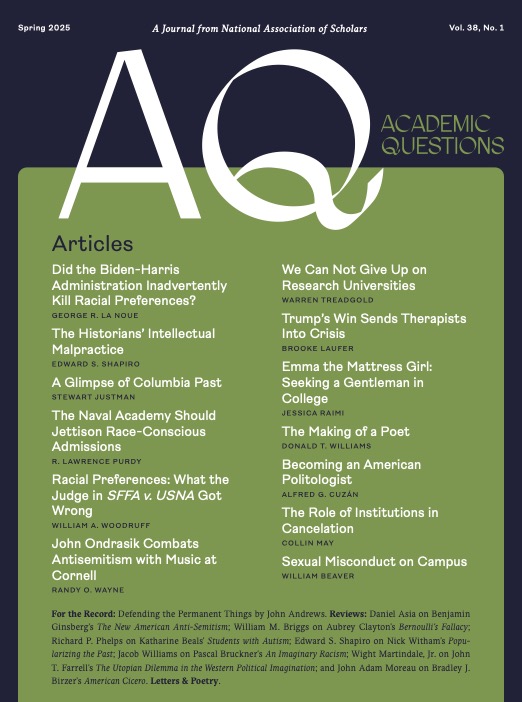March 20, 2019
Once educational innovators and forceful exponents of the higher education ideal, university presidents are today more likely to be fundraisers for big capital projects and public relations hacks. Jos......
March 29, 2019
Exemplars of openness and inquiry in the twentieth century, colleges and universities have turned toward orthodoxy and indoctrination in the twenty-first. Heather Heying explains that a small number o......
March 29, 2019
Free speech, open inquiry, and the study and debate of a broad range of ideas have long been central features of any properly functioning university. Unfortunately, these are not predominant features......
March 20, 2019
University presidents seem powerless to address the wide range of problems currently plaguing higher education. Defenders deflect blame toward off-campus targets for such difficulties as skyrocketing......
March 20, 2019
A faculty member at the University of Missouri-St. Louis watched in amazement and horror as UM-Columbia President Tim Wolfe and Chancellor R. Bowen Loftin resigned over allegations of racism at the un......
March 20, 2019
“Texas,” writes Mark Pulliam, “exhibits a governance vacuum for higher education—a perfect storm for mischief by leftist faculty and bureaucrats.” Gregory Fenves, a forme......
March 20, 2019
Through actions, words, and a transformative vision, President Michael Crow has made Arizona State University one of only fourteen institutions to receive the highest free speech rating from the Found......
March 29, 2019
Peter Wood, president of the National Association of Scholars, Steve Balch, its founding president, and Norman Podhoretz share their thoughts on the passing of the revered scholar, teacher, and h......
March 20, 2019
American colleges and universities have long dispensed with efforts to honor or commemorate Christopher Columbus. But according to Robert Carle, “most Americans know very little about this enigm......
March 20, 2019
Arriving late behind select religious institutions and municipalities, American college campuses are now full partners in the effort to protect illegal immigrants. With increasing enrollment of both l......
March 20, 2019
This study of female college students and recent graduates indicates that campus discrimination based on conservative political ideology might exceed that based on gender. As elsewhere throughout Amer......
March 20, 2019
The fragmentation of higher education into increasingly narrow fields of specialization, along with its vocational focus, has precluded the quest for wisdom and, hence, happiness. What’s needed,......
March 20, 2019
The son of an illiterate Slovak coachman, Tomas G. Masaryk rose to become the founder and first president of Czecho-Slovakia in 1918, a “Western-oriented, non-Marxist, democratic republic in Cen......
March 20, 2019
A review of The Diversity Delusion: How Race and Gender Pandering Corrupt the University and Undermine Our Culture, by Heather Mac Donald, New York, St. Martin's Press, 2018, 278 pp., $2......
March 20, 2019
A review of The Coddling of the American Mind: How Good Intentions and Bad Ideas Are Setting Up a Generation for Failure, by Greg Lukianoff and Jonathan Haidt, Penguin Press, 2018, 352 pp., $12.83 har......
